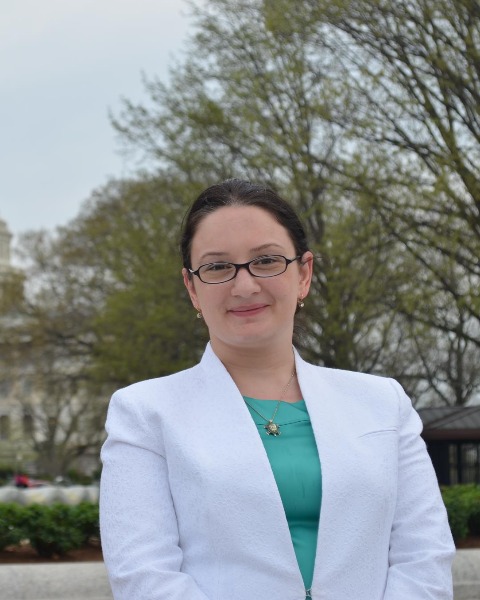Poster
Democracy and Governance
Democracy and Governance Poster Viewing
53 - Lessons learned from integrating research and learning in a global, multidisciplinary, consortium approach to empowering women and girls.
Wednesday, October 11, 2023
5:30 PM - 7:00 PM ET
Location: Griffin Hall

Salome Tsereteli-Stephens (she/her/hers)
Director - Learning, Evaluation, and Impact
American Bar Association Center for Global Programs, United States- SB
Sarah Byrn, n/a
MEL Associate
ABA ROLI, United States
Author(s)
Abstract Information: Integrating a learning agenda into a global program is easier said than done. The Women and Girls Empowered (WAGE) Global consortium set out to meet this challenge, while implementing an integrated program in multiple countries around the globe to prevent and respond to gender-based violence, support women’s economic empowerment, and advance the women peace and security agenda. This poster will tell the story of how robust research and learning agenda was integrated into all phases of program implementation. As a part of the program, partner organizations tested and improved several assessment approaches, data collection tools, and modes of reflecting on program performance and outcomes. We present the approach, timeline, and structure of planning and implementing a learning agenda and innovation in drawing experts through an advisory group and network formed to support the consortium. The poster will also highlight the challenges encountered during the implementation of this approach and the lessons learned from them.
Relevance Statement: Women and Girls Empowered (WAGE) takes a unique approach to significant women’s issues in the world; gender-based violence (GBV), women peace and security, and women’s economic empowerment. A highly collaborative global consortium integrated these issues into country specific programming. For example, in Eswatini, WAGE worked strategically with civil society organizations, government, and private sector to implement economic strengthening programs, but ensured the programs did not have negative unintended consequences like increased rates of GBV. WAGE also led legal reform to legalize legal aid so that women at risk of GBV could gain access to justice. In Ghana, WAGE implemented a highly participatory gender and inclusion analysis, which created a foundation for follow-up programming with robust participation of local community. WAGE recognizes that one empowerment indicator does not tell the full story of a women’s life, so instead brings an integrated, intersectional, and multidisciplinary approach to programming. While program goals were directed at improving livelihoods, there was also an intentional focus on the learning agenda and developing promising practices in these issues. The program regularly paused and reflected on progress and planned evaluations and learning questions from the very beginning of the implementation, to integrate qualitative and quantitative measures into the programming. To further strengthen the approach, WAGE created an advisory group and network (AG&N), consisting of experts in the various relevant fields from around the world, representing practitioners and academics. The AG&N participated in the program by providing expert insights on current themes and reflecting on the WAGE programming through their expert lens. The lessons described in this poster are valuable to anyone working in women’s empowerment, but also those working in consortiums or evaluation focused on growing applicable knowledge. This poster tells the story of the WAGE program, which dared to have a multidisciplinary, collaborative approach, and culminated in lessons learned that can be applied to a wide audience.
Relevance Statement: Women and Girls Empowered (WAGE) takes a unique approach to significant women’s issues in the world; gender-based violence (GBV), women peace and security, and women’s economic empowerment. A highly collaborative global consortium integrated these issues into country specific programming. For example, in Eswatini, WAGE worked strategically with civil society organizations, government, and private sector to implement economic strengthening programs, but ensured the programs did not have negative unintended consequences like increased rates of GBV. WAGE also led legal reform to legalize legal aid so that women at risk of GBV could gain access to justice. In Ghana, WAGE implemented a highly participatory gender and inclusion analysis, which created a foundation for follow-up programming with robust participation of local community. WAGE recognizes that one empowerment indicator does not tell the full story of a women’s life, so instead brings an integrated, intersectional, and multidisciplinary approach to programming. While program goals were directed at improving livelihoods, there was also an intentional focus on the learning agenda and developing promising practices in these issues. The program regularly paused and reflected on progress and planned evaluations and learning questions from the very beginning of the implementation, to integrate qualitative and quantitative measures into the programming. To further strengthen the approach, WAGE created an advisory group and network (AG&N), consisting of experts in the various relevant fields from around the world, representing practitioners and academics. The AG&N participated in the program by providing expert insights on current themes and reflecting on the WAGE programming through their expert lens. The lessons described in this poster are valuable to anyone working in women’s empowerment, but also those working in consortiums or evaluation focused on growing applicable knowledge. This poster tells the story of the WAGE program, which dared to have a multidisciplinary, collaborative approach, and culminated in lessons learned that can be applied to a wide audience.
